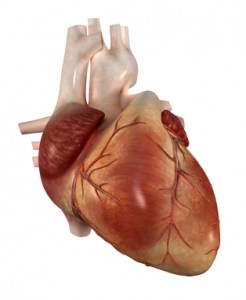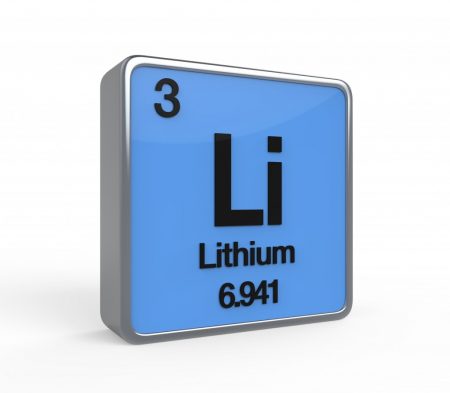Lithium Extends Telomeres
 Telomeres sit at the ends of strands of DNA at each chromosome. Various events make telomeres decrease in length: cell division/replication, stress, aging, and depressive episodes in Bipolar II disorder.
Telomeres sit at the ends of strands of DNA at each chromosome. Various events make telomeres decrease in length: cell division/replication, stress, aging, and depressive episodes in Bipolar II disorder.
Martin Schalling, a professor of medical genetics at the Karolinska Institutet in Sweden, has found that lithium treatment lengthens telomeres.
Editor’s Note: This finding by Schalling, which will soon be published, adds to the list of beneficial neurobiological effects of lithium, including increasing cell survival factors BDNF and Bcl-2, decreasing cell death factors BAX and p53, increasing marker of neuronal integrity NAA, and possibly increasing hippocampal and cortical grey matter volumes.
Clinically, lithium decreases recurrence of manic and depressive episodes (mania more than depression), decreases suicidality, and may slow cognitive deterioration in those with mild cognitive impairment.
These clinical and neurobiological benefits to lithium treatment should be factored in to calculations of the risk/benefit ratio for lithium use in long-term preventative treatment of bipolar disorder.
More Data that Long Term Lithium Treatment Does NOT CAUSE RENAL TOXICITY (more than those on valproate).
In a recent meeting, Mark Weiser of Sheba Medical Center analysed data from “from the Clalit Health Services (CHS) database, the largest provider of health insurance in Israel, n=4.8 million, representing over 50% of the Israeli population. This study examined lithium use between the years 2000 and 2022, focusing on its impact on kidney and thyroid function…(and) compared all patients receiving lithium (n=19,433) to all patients receiving valproic acid (n=44,524). There was no different in the life-time rates of dialysis between patients treated with lithium and patients treated with valproic acid (1.03% vs 0.99%, p = 0.683). A lifetime diagnosis of hypothyroidism was more common in patients receiving lithium (21.84%) in comparison to patients treated with valproic acid (8.83%, p = <0.0001). Conclusions: In this large population study, treatment with lithium was not associated with decreased kidney function but was associated with a clinical diagnosis of hypothyroidism. These factors should be taken into account when considering treatment with lithium.”
Editors Note: In patients on lithium, overtime there are small decreases in estimated glomerular filtration rate (eGFR), but these do not differ from those seen in physiological age adjusted eGFR in the general population. These data are convergent with the large national studies of Kessing et al in Denmark and indicate that the long-held view of lithium causing undo renal toxicity are not accurate and are based on inappropriate suppositions without an adequate control group. They found more end-stage renal dysfunction in bipolar patients treated with anticonvulsants than with lithium.
THERE IS A GRAVE UNDERUTILIZATION OF LITHIUM DUE IN LARGE PART TO THE FALSE ASSUMPTION THAT IT CAUSES EXCESS RENAL TOXICITY. PATIENTS AND CLINICIANS SHOULD BE MADE AWARE OF THE NEW DATA THAT THIS IS LIKELY RELATED TO POOR METHODOLOGY AND BEGIN TO MORE FREQUENTLY THINK ABOUT USING LITHIUM — UNEQUIVOCALLY THE BEST DRUG FOR THE TREATMENT OF BIPOLAR DISORDER. LITHIUM ALSO HAS THE BEST DATA FOR REDUCING EPISODES OF BOTH DEPRESSION AND MANIA AND FOR HAVING POSITIVE EFFECTS IN PREVENTING SUICIDE. USING LITHIUM MORE OFTEN WILL UNDOUBTEDLY MARKEDLY IMPROVE PATIENTS WELL BEING AND SURVIVAL. THIS EDITOR BELIEVES THAT GIVEN LITHIUM’S MULTIFACETED ROLE IN AMELIORATING ALMOST ALL ASPECTS OF THE COURSE OF BIPOLAR DISORDER, IT SHOULD BE CONSIDERED A “DISEASE MODIFYING DRUG.” THERE ARE MULTIPLE DISEASE MODIFYING DRUGS FOR TREATMENT OF MULTIPLE SCLEROSIS, AND EXPERTS IN THAT FIELD BELIEVE THAT DISEASE MODIFYING SHOULD BE STARTED AS EARLY AS POSSIBLE AFTER FIRST DIAGNOSIS. A SIMILAR CONCLUSION WOULD NOW APPEAR APPROPRIATE FOR LITHIUM.
Of note is the other widely held reason for not using lithium more often is that it causes hypothyroidism. While this is clearly correct based on the Weiser study and many other data, patients should be aware that this well-known condition is readily correctable with thyroid hormone replacement and does not produce an undo burden on patients.
Since lithium has many other assets including: increasing hippocampal volume; protecting memory; and increasing the length of telomeres (critical to sustaining good medical and psychiatric health), its wider use in bipolar disorder should be a no brainer. However, it is likely (like most revisions in medical lore) to take 10 years or more before this re-evaluation of lithium has an impact on conventional treatment decisions, so physicians should make very active and conscious decisions about changing their routine choices of treatment for each patient with bipolar disorder.
Cognitive Function and White Matter Integrity in Individuals With Bipolar Disorder
Highlights from Posters Presented at the Society of Biological Psychiatry Meeting, April 27-29, 2023 in San Diego
Jennifer McDowell reported that they found “significantly reduced FA (fractional anisotropy) values in 85 bipolar probands compared to 66 controls” in multiple (n=8) white matter tracts. There were significantly lower scores in bipolar probands compared to controls on composite scores, ( p = 0.007), verbal fluency, ( p < 0.001), and symbol coding, (p = 0.023). They concluded that: “ Impacted connectivity in critical fiber tracts may be key to understanding the neural underpinnings of deficits, like cognition, observed in this clinical population.”
Editors note: It is of interest that lithium has been shown to normalize some white matter abnormalities in youngsters and help preserve cognitive function in older individuals. On this and many other accounts, way too little lithium is being used in the treatment of patients with bipolar disorder. Lithium not only increases neurogenesis (new grey matter neurons) and hippocampal volume, but also has positive effects on white matter tracts and even increases the length of one’s telomeres (which keeps you more healthy). In other ungrammatical words, “If your brain is not connected right, it don’t work right.”
LITHIUM’S AMAZING DIVERSITY OF ASSETS
Editor’s Note: Lithium is vastly underutilized. There is wide spread ignorance about its many assets and misconceptions about its few side effects. Here is an update that should be of interest to potential users, family members, and clinicians.
Lithium:
- Prevents unipolar and bipolar depression
- Augments effects of antidepressants in unipolar depression
- Potentiates the effects of atypical antipsychotics in treating mania and depression
- Reduces inflammation
- Normalizes some aspects of cardiovascular risk
- Normalizes secretions for monocytes and leukocytes
- Increases neurogenesis, BCl-2, and hippocampal and thalamic volumes
- The increases in neuroprotective factors occurs at brain levels below typical therapeutic dosages
- Protects against memory deterioration
- Lowers dementia risk in old age
- Reduces suicide clinically and at minute concentrations in the water supply
- Lengthens telomeres and increases longevity
- Reduces size of lesions in models of stroke, AIDS, and Huntington’s chorea
- Normalizes circadian rhythms
- Reduces manic-like behavior induced by clock gene mutations
- Prevents calcium currents and increased firing rate in stem cells from bipolar patients
- Induces minimal to no weight gain on long term follow up
- Does not increase risk of kidney failure when given at blood levels of .6 to .8 blood levels
- Protects against spine and hip osteoporosis
Conclusion: With so many assets and so few liabilities, physicians and patients should reconsider the benefits of lithium and use it more often, not only in the few who respond to it as a monotherapy, but as a adjunct to the many other treatments of bipolar disorder. This should be a “no brainer” as lithium will very likely help some have fewer problems from their illness and may even help them live longer.
Many of these points are summarized in the open access publication: Robert M Post, The New News About Lithium: An Underutilized Treatment in The United States, Neuropsychopharmacology accepted article preview 4 October 2017; several new updates have been added from the International Society on Bipolar Disorders meeting, Chicago, June, 2023.
Lithium Better than Other Mood Stabilizers for Youth with Bipolar Disorder
A new study by Danella M. Hafeman and colleagues finds that lithium is superior to other mood stabilizers in young people. The data in this case come from 340 youth aged 7–17 who participated in a study known as Course and Outcome of Bipolar Youth (COBY).
At each visit over an average of 10 years, participants reported medications taken, symptoms they had experienced, etc. during the preceding six-month period. During times that participants had taken lithium (compared to other mood stabilizers) they were older, on fewer antidepressants, and they were less likely to have an anxiety disorder.
Those participants who took lithium had half as many suicide attempts, fewer depressive symptoms, less psychosocial impairment, and less aggression than those who took other mood stabilizers.
The researchers concluded, “Findings are consistent with adult studies, showing that lithium is associated with decreased suicidality, less depression, and better psychosocial functioning. Given the paucity of evidence regarding lithium in children and adolescents, these findings have important clinical implications for the pharmacological management of youth with bipolar disorder.”
Editor’s Note: Lithium should especially be considered in those with a family history of mood disorders, and in particular in those with a family history of good response to lithium. Lithium is under-prescribed in both adults and children and should be given much higher consideration in light of the multiple benefits it provides in addition to mood stabilization. These include maintenance of memory, increases in longevity (perhaps based in its ability to increase the length of telomeres, the bits of protective material at the end of DNA strands that deteriorate with age and illness), and neuroprotection against loss of gray and white matter volume in the brain, which often occurs in mood disorders.
Family History of Lithium Response A Potent Predictor of Lithium Effectiveness
Researcher Martin Alda and colleagues reported at a 2018 scientific meeting that a family history of good response to lithium is highly predictive of response to lithium in a current bipolar patient. A good prospective response to lithium was seen in 68.6% of patients with a family member who responded well to lithium. Only 22% of those without a family member with a positive lithium response responded well to lithium.
Editor’s Note: Other predictors of a good response to lithium include: a family history of mood disorder, classical euphoric mania with clear-cut well intervals between episodes, lack of a simultaneous anxiety or substance abuse disorder, starting lithium early rather than late in the course of illness after many episodes or rapid cycling has occurred, and a sequential pattern of episodes of mania followed by depression, and then an interval of wellness (i.e. M-D-I rather than D-M-I). Even in those without these characteristics, lithium has many benefits including neuroprotection, reduction of suicide risk, and improved medical health (perhaps through its ability to increase the length of telomeres which are bits of DNA at the end of each chromosome). Longer telomeres are protective, while people with shorter ones may be vulnerable to some medical and psychiatric illnesses.
Lithium Superior to Other Mood Stabilizers in a Longitudinal Study of Bipolar Youth
At a late-2018 scientific meeting, researcher Danella Hafeman and colleagues reported some results of the Course and Outcome of Bipolar Youth (COBY) study. The study includes long-term follow up of 413 youth with bipolar disorder, who ranged in age from 7 to 17 years old. Hafeman and colleagues reported that taking lithium more than 75% of the time was linked to fewer suicide attempts, fewer depressive symptoms, and fewer psychosocial difficulties than taking another mood stabilizer (such as an atypical antipsychotic, lamotrigine, or valproic acid) more than 75% of the time after adjusting for demographic variables.
Despite the limitations of observational studies such as this one, the authors concluded, “Our findings are consistent with studies in adult populations, showing that lithium (compared to other mood stabilizers) is associated with decreased suicidality, less depression, and better psychosocial functioning. Given the paucity of evidence regarding lithium in children and adolescents, these findings have important clinical implications for the pharmacological management of youth with [bipolar disorder].”
Editor’s Note: These observations are consistent with several other studies. Researcher Barbara Geller and colleagues observed in eight years of follow up of children diagnosed with bipolar disorder that those who were treated with lithium spent more time in remission than those who took other medicines. A randomized controlled study by researcher Robert Findling and colleagues documented that maintenance lithium treatment was more effective than placebo at preventing bipolar episodes. Together, these data suggest that lithium should be used more often in the long-term treatment of children with bipolar disorder.
Way ahead of his time in about 1993, the renowned child psychiatrist Dennis Cantwell said something like this: “If I had an adolescent child with a first manic episode, I would have him stay on lithium for the rest of his life.” He seems to have been prescient, as evidence of the many benefits of lithium over other alternatives in the treatment of both children and adults has been accumulating.
An open-access review article this editor (Robert M. Post) published in the journal Neuropsychopharmacology in 2017, “The New News about Lithium: An Underutilized Treatment in the United States,” argues that lithium’s many benefits have been underestimated, while its side effects have been overestimated. It is my view that it would be beneficial if lithium were more often included in the treatment regimen of adults as well as children and adolescents with bipolar disorder.
Lithium has an astounding range of effectiveness. It prevents recurrent depressions and suicide (even in those with unipolar depression), increases hippocampal and cortical volume, protects memory, and increases the length of telomeres (the end portions of chromosomes that protect them as they replicate). In multiple animal models of neurological diseases, it has also been found to be neuroprotective and to reduce the size of brain lesions.
Large Finnish Study Finds Lithium is Best at Preventing Re-Hospitalizations in Bipolar Disorder
A 2018 article in the journal JAMA Psychiatry reports that lithium and long-acting antipsychotic injections were most effective at preventing re-hospitalizations among people with bipolar disorder.
The study by Markku Lähteenvuo and colleagues included 18,018 Finnish patients with bipolar disorder. A national database contained information on any hospitalizations that occurred among the patients and what medications were dispersed to patients.
Among the participants, 54% (9,721 patients) were re-hospitalized at least once over a study period of 16 years. Medications associated with the smallest risk of re-hospitalization for psychiatric reasons were long-acting injections of risperidone, gabapentin, long-acting injections of perphenazine, and lithium carbonate.
When the researchers looked at hospitalizations for any cause (not just psychiatric illness), lithium was associated with the least risk of re-hospitalization, while benzodiazepines had the greatest risk, both for psychiatric re-hospitalization and re-hospitalization for any cause.
Long-acting injectable medications were associated with less risk of re-hospitalization compared to the identical medications delivered orally.
Lähteenvuo and colleagues concluded, “Lithium…should remain as the first line of treatment for bipolar disorder, after decades of underprescription.” They suggest that long-acting injectable medications may be a good alternative to prevent relapse in patients for whom lithium is unsuitable.
Editor’s Note: In addition to lithium’s ability to prevent depressions and manias, it also increases the volume of the hippocampus and protects against a diagnosis of dementia in old age. Lithium decreases the risk for suicide and also increases the length of telomeres, bits on the ends of DNA strands that protect them as they replicate, which are important to the maintenance of both physical and psychiatric health. When lithium is used cautiously to maintain doses below a given patient’s side effects threshold, it is very well tolerated by most individuals.
Minimizing Cardiovascular Risk in Bipolar Disorder
 At the 2017 meeting of the American Association of Child and Adolescent Psychopharmacology, researcher Ben Goldstein gave an overview on cardiovascular risk and bipolar disorder. He noted a study by Nicole Kozloff and colleagues in the Journal of Affective Disorders in 2010 that indicated that onset of cardiovascular disorder occurred an average of 17 years earlier in those with BP I (at age 40-45 years) compared to controls (at age 55-60 years). Several risk factors made onset of cardiovascular disorder more likely, including diabetes, obesity, and the metabolic syndrome (which consists of any three of the five following symptoms: high cholesterol, triglycerides, blood sugar, blood pressure, and waist circumference).
At the 2017 meeting of the American Association of Child and Adolescent Psychopharmacology, researcher Ben Goldstein gave an overview on cardiovascular risk and bipolar disorder. He noted a study by Nicole Kozloff and colleagues in the Journal of Affective Disorders in 2010 that indicated that onset of cardiovascular disorder occurred an average of 17 years earlier in those with BP I (at age 40-45 years) compared to controls (at age 55-60 years). Several risk factors made onset of cardiovascular disorder more likely, including diabetes, obesity, and the metabolic syndrome (which consists of any three of the five following symptoms: high cholesterol, triglycerides, blood sugar, blood pressure, and waist circumference).
Risk factors include pathophysiological and behavioral mechanisms and certain medications. Pathophysiological mechanisms include inflammation, oxidative stress, and autonomic and endothelial dysfunction.
Behavioral mechanisms include poor diet, exercise, sleep, and increases in tobacco and alcohol use.
Medications could also contribute, with the most to least problematic for weight gain including, among atypical antipsychotics: clozapine, olanzapine, risperidone, quetiapine, aripiprazole, ziprasidone, and lurasidone. Among mood stabilizers, worst to best for avoiding weight gain are: valproate, lithium, carbamazepine, oxcarbazepine, and lamotrigine.
Goldstein has data from retinal vascular photography (RVP), whereby blood vessels can be observed directly. As opposed to in adults, in youth large vessels are more problematic and arteriolar to venous ratio is abnormally higher in bipolar children compared to normal controls. This ratio is lower in bipolar adults, also reflecting increased cardiovascular risk.
Given the huge loss of life expectancy in bipolar disorder, primarily from cardiovascular disorders, Goldstein urges greater and earlier attention to reducing the pathophysiological, behavioral, and pharmacological mechanisms for poor health. These should be pursued in parallel with attempts at mood stabilization. Read more
The New News About Lithium
Robert M. Post, Editor-in-Chief of the BNN, recently published an open access article in the journal Neuropsychopharmacology, “The New News About Lithium: An Underutilized Treatment in the United States.” Here we summarize the main points of the publication, including: the multiple benefits of lithium, its relative safety, predictors of lithium responsiveness, and principles for treatment.
Benefits of lithium
Lithium prevents both depressions and manias in bipolar disorder, and also prevents depressions in unipolar disorder and can augment antidepressant effects acutely. In addition to these mood benefits, lithium has anti-suicide effects. Lithium also enhances the efficacy of atypical antipsychotics and other mood stabilizers when used in combination with them.
Lithium is good for the brain. It has been shown to reduce the incidence of dementia. Lithium increases the volume of the hippocampus and cortex, and can increase the production of new neurons and glia. It also protects neurons. In animals, lithium has been shown to reduce lesion size in neurological syndromes that are models for human disorders such as AIDS-related neurotoxicity, ischemic/hemorrhagic stroke, traumatic brain/spinal cord injury, Huntington’s disease, Alzheimer’s disease, amyotrophic lateral sclerosis (ALS or Lou Gehrig’s disease), fragile X syndrome, Parkinson’s disease, retinal degeneration, multiple sclerosis, alcohol-induced degeneration, Down’s syndrome, spinocerebellar ataxia-1, and irradiation.
Lithium’s benefits include more general ones as well. It can increase the length of telomeres, bits of DNA on the ends of chromosomes that protect them during replication. Short telomeres have been linked to various illnesses and the aging process. Lithium also decreases the incidence of several medical illnesses and enhances survival.
Side Effects Are Often Benign, Treatable
Lithium side effects are more benign than many people think. Even low levels of lithium may be therapeutically sufficient. Read more






